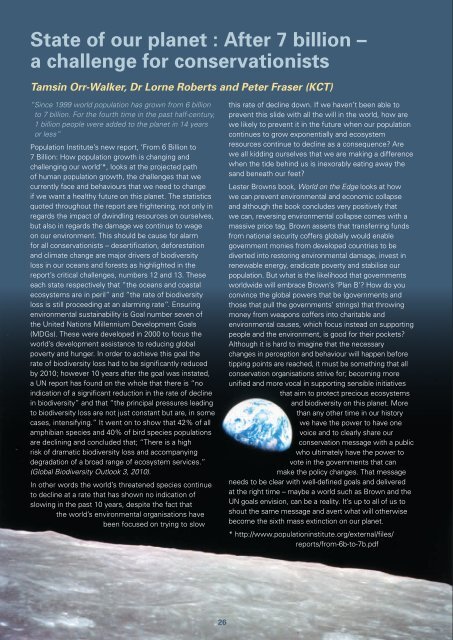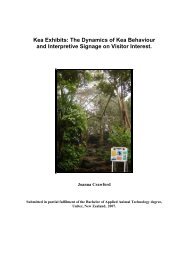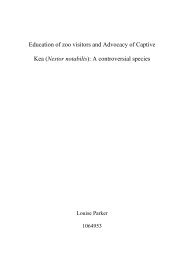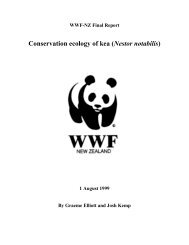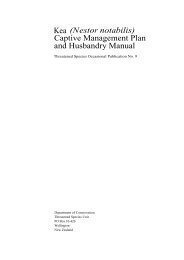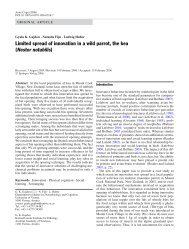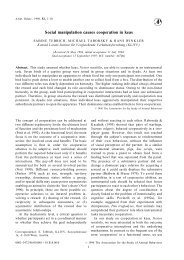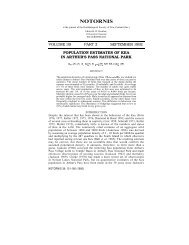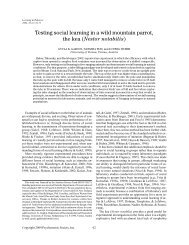Education and Advocacy in Conservation – What's the measure?
Education and Advocacy in Conservation – What's the measure?
Education and Advocacy in Conservation – What's the measure?
You also want an ePaper? Increase the reach of your titles
YUMPU automatically turns print PDFs into web optimized ePapers that Google loves.
State of our planet : After 7 billion <strong>–</strong><br />
a challenge for conservationists<br />
Tams<strong>in</strong> Orr-Walker, Dr Lorne Roberts <strong>and</strong> Peter Fraser (KCT)<br />
“ S<strong>in</strong>ce 1999 world population has grown from 6 billion<br />
to 7 billion. For <strong>the</strong> fourth time <strong>in</strong> <strong>the</strong> past half-century,<br />
1 billion people were added to <strong>the</strong> planet <strong>in</strong> 14 years<br />
or less”<br />
Population Institute’s new report, ‘From 6 Billion to<br />
7 Billion: How population growth is chang<strong>in</strong>g <strong>and</strong><br />
challeng<strong>in</strong>g our world’*, looks at <strong>the</strong> projected path<br />
of human population growth, <strong>the</strong> challenges that we<br />
currently face <strong>and</strong> behaviours that we need to change<br />
if we want a healthy future on this planet. The statistics<br />
quoted throughout <strong>the</strong> report are frighten<strong>in</strong>g, not only <strong>in</strong><br />
regards <strong>the</strong> impact of dw<strong>in</strong>dl<strong>in</strong>g resources on ourselves,<br />
but also <strong>in</strong> regards <strong>the</strong> damage we cont<strong>in</strong>ue to wage<br />
on our environment. This should be cause for alarm<br />
for all conservationists <strong>–</strong> desertification, deforestation<br />
<strong>and</strong> climate change are major drivers of biodiversity<br />
loss <strong>in</strong> our oceans <strong>and</strong> forests as highlighted <strong>in</strong> <strong>the</strong><br />
report’s critical challenges, numbers 12 <strong>and</strong> 13. These<br />
each state respectively that “<strong>the</strong> oceans <strong>and</strong> coastal<br />
ecosystems are <strong>in</strong> peril” <strong>and</strong> “<strong>the</strong> rate of biodiversity<br />
loss is still proceed<strong>in</strong>g at an alarm<strong>in</strong>g rate”. Ensur<strong>in</strong>g<br />
environmental susta<strong>in</strong>ability is Goal number seven of<br />
<strong>the</strong> United Nations Millennium Development Goals<br />
(MDGs). These were developed <strong>in</strong> 2000 to focus <strong>the</strong><br />
world’s development assistance to reduc<strong>in</strong>g global<br />
poverty <strong>and</strong> hunger. In order to achieve this goal <strong>the</strong><br />
rate of biodiversity loss had to be significantly reduced<br />
by 2010; however 10 years after <strong>the</strong> goal was <strong>in</strong>stated,<br />
a UN report has found on <strong>the</strong> whole that <strong>the</strong>re is “no<br />
<strong>in</strong>dication of a significant reduction <strong>in</strong> <strong>the</strong> rate of decl<strong>in</strong>e<br />
<strong>in</strong> biodiversity” <strong>and</strong> that “<strong>the</strong> pr<strong>in</strong>cipal pressures lead<strong>in</strong>g<br />
to biodiversity loss are not just constant but are, <strong>in</strong> some<br />
cases, <strong>in</strong>tensify<strong>in</strong>g.” It went on to show that 42% of all<br />
amphibian species <strong>and</strong> 40% of bird species populations<br />
are decl<strong>in</strong><strong>in</strong>g <strong>and</strong> concluded that; “There is a high<br />
risk of dramatic biodiversity loss <strong>and</strong> accompany<strong>in</strong>g<br />
degradation of a broad range of ecosystem services.”<br />
(Global Biodiversity Outlook 3, 2010).<br />
In o<strong>the</strong>r words <strong>the</strong> world’s threatened species cont<strong>in</strong>ue<br />
to decl<strong>in</strong>e at a rate that has shown no <strong>in</strong>dication of<br />
slow<strong>in</strong>g <strong>in</strong> <strong>the</strong> past 10 years, despite <strong>the</strong> fact that<br />
<strong>the</strong> world’s environmental organisations have<br />
been focused on try<strong>in</strong>g to slow<br />
26<br />
this rate of decl<strong>in</strong>e down. If we haven’t been able to<br />
prevent this slide with all <strong>the</strong> will <strong>in</strong> <strong>the</strong> world, how are<br />
we likely to prevent it <strong>in</strong> <strong>the</strong> future when our population<br />
cont<strong>in</strong>ues to grow exponentially <strong>and</strong> ecosystem<br />
resources cont<strong>in</strong>ue to decl<strong>in</strong>e as a consequence? Are<br />
we all kidd<strong>in</strong>g ourselves that we are mak<strong>in</strong>g a difference<br />
when <strong>the</strong> tide beh<strong>in</strong>d us is <strong>in</strong>exorably eat<strong>in</strong>g away <strong>the</strong><br />
s<strong>and</strong> beneath our feet?<br />
Lester Browns book, World on <strong>the</strong> Edge looks at how<br />
we can prevent environmental <strong>and</strong> economic collapse<br />
<strong>and</strong> although <strong>the</strong> book concludes very positively that<br />
we can, revers<strong>in</strong>g environmental collapse comes with a<br />
massive price tag. Brown asserts that transferr<strong>in</strong>g funds<br />
from national security coffers globally would enable<br />
government monies from developed countries to be<br />
diverted <strong>in</strong>to restor<strong>in</strong>g environmental damage, <strong>in</strong>vest <strong>in</strong><br />
renewable energy, eradicate poverty <strong>and</strong> stabilise our<br />
population. But what is <strong>the</strong> likelihood that governments<br />
worldwide will embrace Brown’s ‘Plan B’? How do you<br />
conv<strong>in</strong>ce <strong>the</strong> global powers that be (governments <strong>and</strong><br />
those that pull <strong>the</strong> governments’ str<strong>in</strong>gs) that throw<strong>in</strong>g<br />
money from weapons coffers <strong>in</strong>to charitable <strong>and</strong><br />
environmental causes, which focus <strong>in</strong>stead on support<strong>in</strong>g<br />
people <strong>and</strong> <strong>the</strong> environment, is good for <strong>the</strong>ir pockets?<br />
Although it is hard to imag<strong>in</strong>e that <strong>the</strong> necessary<br />
changes <strong>in</strong> perception <strong>and</strong> behaviour will happen before<br />
tipp<strong>in</strong>g po<strong>in</strong>ts are reached, it must be someth<strong>in</strong>g that all<br />
conservation organisations strive for; becom<strong>in</strong>g more<br />
unified <strong>and</strong> more vocal <strong>in</strong> support<strong>in</strong>g sensible <strong>in</strong>itiatives<br />
that aim to protect precious ecosystems<br />
<strong>and</strong> biodiversity on this planet. More<br />
than any o<strong>the</strong>r time <strong>in</strong> our history<br />
we have <strong>the</strong> power to have one<br />
voice <strong>and</strong> to clearly share our<br />
conservation message with a public<br />
who ultimately have <strong>the</strong> power to<br />
vote <strong>in</strong> <strong>the</strong> governments that can<br />
make <strong>the</strong> policy changes. That message<br />
needs to be clear with well-def<strong>in</strong>ed goals <strong>and</strong> delivered<br />
at <strong>the</strong> right time <strong>–</strong> maybe a world such as Brown <strong>and</strong> <strong>the</strong><br />
UN goals envision, can be a reality. It’s up to all of us to<br />
shout <strong>the</strong> same message <strong>and</strong> avert what will o<strong>the</strong>rwise<br />
become <strong>the</strong> sixth mass ext<strong>in</strong>ction on our planet.<br />
* http://www.population<strong>in</strong>stitute.org/external/files/<br />
reports/from-6b-to-7b.pdf


